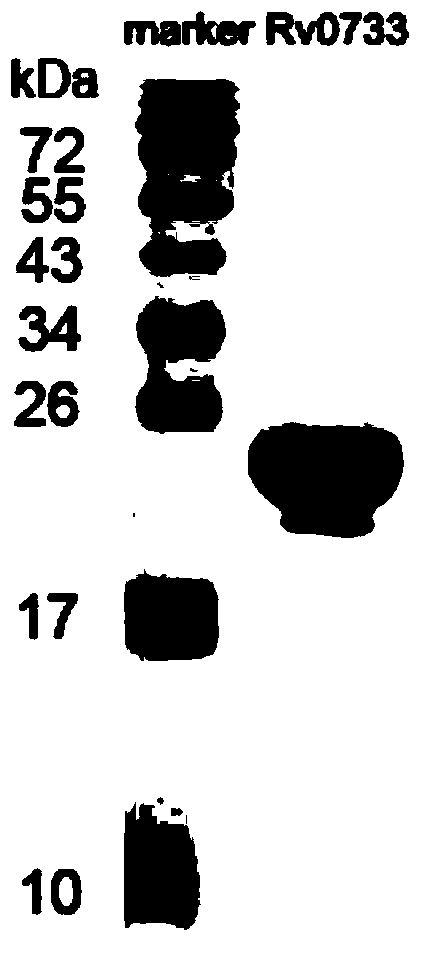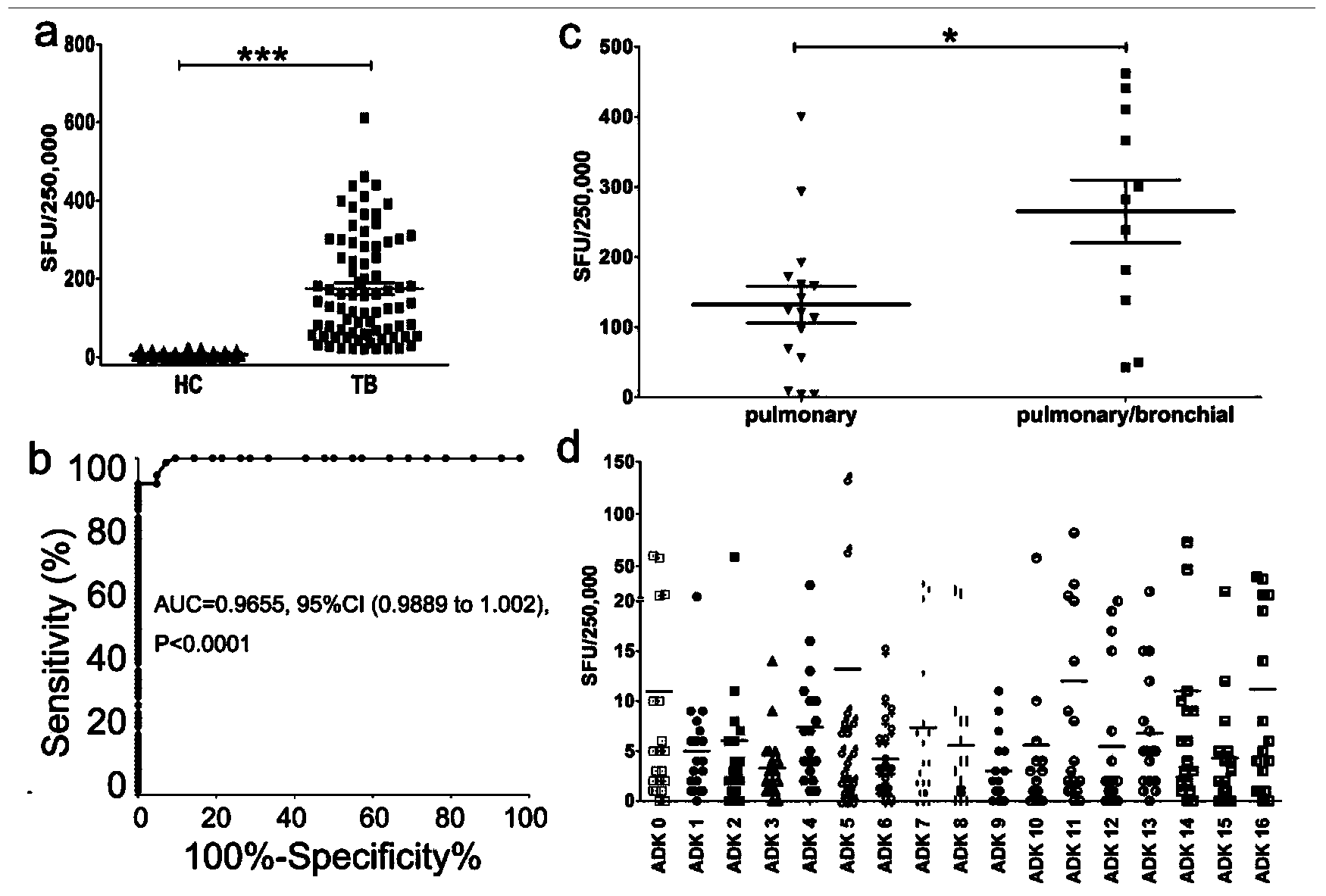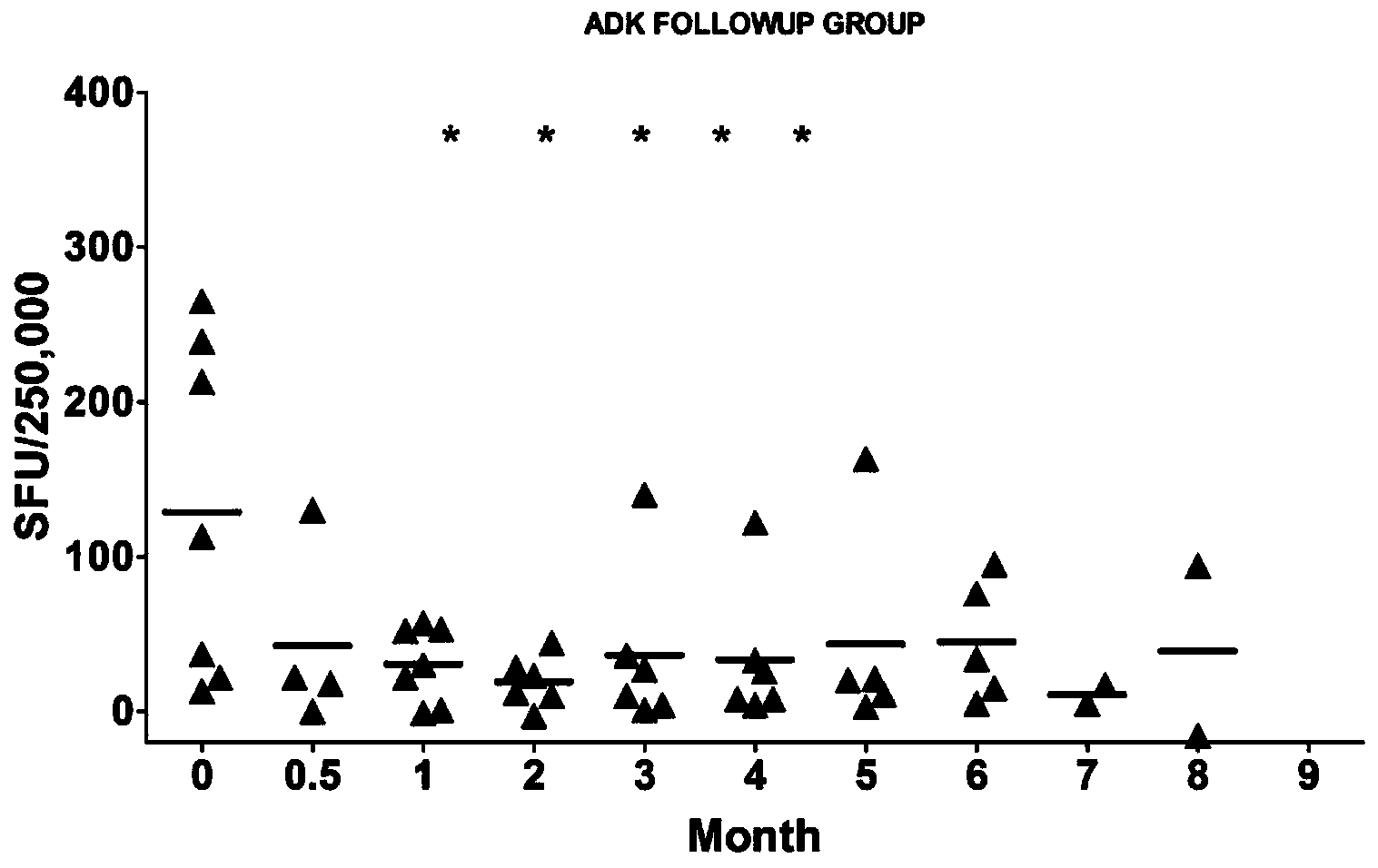Reagent for detecting specific immune response of mycobacterium tuberculosis and use thereof
A technology for mycobacterium tuberculosis and immune response, applied in the field of biomedical testing, can solve problems such as false positives, unsatisfactory results, and poor detection value, and achieve the effects of simple operation, easy promotion, and improved detection sensitivity and specificity
- Summary
- Abstract
- Description
- Claims
- Application Information
AI Technical Summary
Problems solved by technology
Method used
Image
Examples
Embodiment 1
[0053] Example 1: Preparation of Mycobacterium tuberculosis Rv0733 polypeptide and antigen.
[0054] 1. The experimental steps for the preparation of the Rv0733 fusion protein (antigen) are as follows:
[0055] 1. The Rv0733 gene was cloned from the DNA of Mycobacterium tuberculosis by PCR. After sequencing, the gene fragment was inserted into the E. coli expression plasmid pET28a to construct the pET28a-Rv0733 prokaryotic expression plasmid.
[0056] 2. The pET28a-Rv0733 prokaryotic expression plasmid was transformed into E.coli BL21 (DE3) to construct expression engineering bacteria.
[0057] 3. Induce the expression with 0.4mM IPTG at 30℃, 220rpm for 3h.
[0058] 4. Lysate the bacteria by ultrasonic and collect the supernatant protein solution after centrifugation.
[0059] 5. Purify the Rv0733 fusion protein with Ni-NTA magnetic beads.
[0060] 6. The concentration of fusion protein was detected by BCA (Pierce, 23227) method, and stored in -80 ℃ refrigerator.
[0061] ...
Embodiment 2
[0082] Example 2: ELISPOT detection of the number of specific gamma interferon-releasing cells stimulated by Rv0733 and its antigenic peptides
[0083] The experimental steps are as follows:
[0084] 1. Coat 96-well PVDF plate (Millipore MSIPS4510) for ELISPOT with IFN-γ antibody, overnight at 4°C.
[0085] 2. Wash 3 times with 200 μl per well of PBS or RPMI1640 and block with RPMI1640 containing 10% FBS for 1 hour at 37°C.
[0086] 3. About 5 ml of heparin sodium, sodium citrate or dipotassium EDTA anticoagulant tubes are collected from the periphery of tuberculosis patients or normal controls.
[0087] 4. Use Ficoll density gradient centrifugation, 1000×g, 18-22℃, centrifuge for 22min. Peripheral blood mononuclear cells (PBMC) were isolated.
[0088] 5. PBMCs were washed twice with 5-10ml PBS or RPMI1640 and resuspended in RPMI1640 containing 10% FBS, counted, and adjusted to a final concentration of 2.5×10 6 cells / ml.
[0089] 6. Add 100 μl of cell suspension to each w...
Embodiment 3
[0097] Example 3: Detection of Rv0733-specific antibody levels in peripheral blood of tuberculosis patients and normal control populations by ELISA.
[0098] The experimental steps are as follows:
[0099] 1. Coat the ELISA 96-well plate (Corning9018) with 1 μg / ml Rv0733 fusion protein, overnight at 4°C.
[0100] 2. Discard the supernatant, wash 5 times with 300 μl of PBS containing 0.05% Tween-20 per well, and pat dry each time on absorbent paper.
[0101] 3. Block with PBS containing 1% gelatin at 37°C for 1 hour.
[0102] 4. Wash 5 times with 300 μl of PBS (PBST) containing 0.05% Tween-20 per well. Add 100 μl of peripheral blood plasma from tuberculosis patients or normal persons diluted 1:100 to each well, and the dilution solution is PBST containing 1% gelatin. Incubate for 1 hour at 37°C.
[0103] 5. Wash 6 times with 300 μl of PBS containing 0.05% Tween-20 per well. Add 100 μl of HRP-labeled anti-human IgG antibody diluted with 1% gelatin in PBST to each well, and ...
PUM
 Login to View More
Login to View More Abstract
Description
Claims
Application Information
 Login to View More
Login to View More - R&D
- Intellectual Property
- Life Sciences
- Materials
- Tech Scout
- Unparalleled Data Quality
- Higher Quality Content
- 60% Fewer Hallucinations
Browse by: Latest US Patents, China's latest patents, Technical Efficacy Thesaurus, Application Domain, Technology Topic, Popular Technical Reports.
© 2025 PatSnap. All rights reserved.Legal|Privacy policy|Modern Slavery Act Transparency Statement|Sitemap|About US| Contact US: help@patsnap.com



